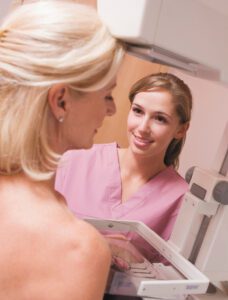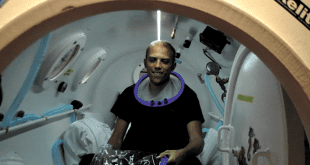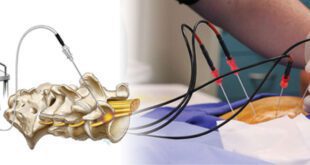By Parveen Vahora, M.D.
 Millions of women and men worldwide are diagnosed with breast cancer each year. With the advent of patient education, there are many more early diagnosis cases now than in years past, which is critical in the survivorship, longevity, and healthy outcomes for patients.
Millions of women and men worldwide are diagnosed with breast cancer each year. With the advent of patient education, there are many more early diagnosis cases now than in years past, which is critical in the survivorship, longevity, and healthy outcomes for patients.
Are you Taking the Proper Steps?
Manual self-breast exams are recommended; however, nothing compares to regular wellness visits with your gynecologist. They are, of course, trained to palpitate for masses, lumps, and bumps, and they go over your symptoms with you one on one. Even better still is having a mammogram. Nowadays, mammograms are cutting edge and able to see even the tiniest malformations and abnormalities.
Advanced Genetic Testing
Hereditary breast and ovarian cancer (HBOC) is primarily associated with mutations in BRCA1 or BRCA2 genes. Mutations in other genes are associated with HBOC but are less common. BRCA gene mutations can be inherited from either the mother or father, and only one copy of the mutation is needed to be at risk.1
HBOC syndrome is associated with an increased risk of the following:1
• Early-onset breast cancer
• Triple-negative breast cancer (estrogen receptor, progesterone receptor, and Her2/neu negative)
• Bilateral breast cancer
• Ovarian cancer at any age
• Prostate cancer
• Pancreatic cancer
• Melanoma
• A second primary cancer
• Cancer recurrence
Genetic Testing in the Comfort of the Office
Dr. Pareen Vahora, M.D., FACOG, a Board-Certified Gynecologist offers Genetic testing in the comfort of her office for her patients. Genetic testing is a cutting-edge medical technique that looks at your unique genetic makeup, which can be used to see how your DNA might shape your health over the
course of your life. A sample of DNA is collected—typically with a small sample of blood or saliva—then analyzed in a lab to look for evidence of genetic disorders or vulnerabilities to some diseases. For example, people with specific gene mutations might develop some cancers earlier in life, or at a higher rate, than the general population. This is particularly the case with breast cancer and the BRCA gene mutations.
MRI: Advanced Imaging
If you are at high risk for breast cancer, it is recommended to have MRIs to evaluate any possible breast cancer diagnosis. Many physicians recommend alternating MRI and mammography to allow for more comprehensive metrics in a patients diagnosis.
BRCA Positive and Estrogen-Hormone Imbalance
In some cases, if you are positive for a BRCA mutation, your gynecologist and surgeon may recommend that you have a partial or full hysterectomy. These precautionary surgeries will reduce your risk of breast cancer by 50% and ovarian cancer by approximately 90%. However, this will cause your body to go into a menopausal state early.
Multiple conflicting research and studies show it’s not safe to receive any hormonal estrogen therapy if you have the BRCA gene. One school of thought is that it intensifies further cell mutations in breast cancer.
When you have early onset menopause caused by surgery, your symptoms, and risk factors are just as uncomfortable as if you were going through the change naturally. These symptoms can cause hot flashes, weight gain, and very painful intercourse. Whether you can’t take estrogen or choose not to, for women of all ages, it’s unfair to experience these distressing symptoms, especially sexual discomfort with your significant other.
MonaLisa Touch®
Due to the limited estrogen supply, the walls of the vagina start to thin out, causing dryness, burning, and inflammation. This can make intercourse very painful and can cause urinary disorders and can even interfere with daily activities for many women due to the extreme pain and discomfort that it can cause.
Dr. Vahora offers MonaLisa Touch®, an advanced procedure the revitalizes the vagina and makes it feel like a younger vagina. For Countless women and their partners, it has turned back the clock of time.
This advanced technology is called the MonaLisa Touch®. It is a new laser therapy for the vagina and vulvar. There are no medications, not cutting and no lengthy healing times with this procedure. It’s similar to having a basic Pap smear test done. The laser does not hurt or cause any pain. You will only feel tiny vibrating sensations from the machine, and the best part is that the entire procedure is accomplished in an outpatient, office setting.
The laser assists with the bodies cell renewal and will regenerate the mucous membrane and help with the restoration of collagen and renewing the proper trophic balance to the membrane.
Now it’s possible to have relief from vaginal and vulvar atrophy due to the MonaLisa Touch’s® ability to gently improve the tissue of the vaginal mucosa. The laser stimulates the production of collagen, improving the functionality of the treated area and restoring the proper trophic balance to the mucous membrane.
Whether you’re in menopause and experiencing vaginal dryness, or if you are suffering from these sexually uncomfortable symptoms due to a hysterectomy or breast cancer, Dr. Vahora can help.
If you are concerned about your genetic mutations and cancer risks, Dr. Vahora is now offering genetic testing for women with a family history of breast, ovarian or uterine cancer, and also for men who may have personal or family history of colon, stomach, prostate, or stomach cancer. Please follow this link for a quiz on your genetic risk factors, https://www.hereditarycancerquiz.com/vahoramd.
Dr. Vahora is an expert on reproductive cancer diagnosis, sexual health and intimacy; please contact her office to schedule a consultation.
FOR APPOINTMENTS CONTACT US:
Email info@ParveenVahoraMD.com
Text Line: (813) 548-4412
Phone Line: (727) 376-1536
The office of Dr. Parveen Vahora is small, intimate, and welcoming. Women under their care are treated with the utmost respect, which means they offer personalized care: educating on conditions and treatment options as well as preventative measures. Their focus is on sexual health—offering MonaLisa Touch® for patients going through menopause as well as post-menopausal women, breast cancer survivors, and those suffering from pain during intercourse or intense dryness. They also offer genetic testing for breast, ovarian, and colon cancer. From birth control to robotic surgery, Dr. Vahora has got you covered.
They follow Enhanced Recovery After Surgery (ERAS®) protocols, which take a comprehensive look at all areas of the patient’s journey through surgery and recovery, creating a well¬-coordinated, team¬-oriented approach to surgical care for better outcomes. Weaving this into personalized care plans, Dr. Vahora and her team get patients back to their normal routines faster.
Inspiring Women to Live Their Best Life by Providing Compassionate and Personalized Care.
Reference:
1. CDC, Centers for Disease Control and Prevention, “Hereditary Breast and Ovarian Cancer (HBOC) Syndrome”, 2019, cdc.gov.
 Central Florida Health and Wellness Magazine Health and Wellness Articles of the Villages
Central Florida Health and Wellness Magazine Health and Wellness Articles of the Villages



